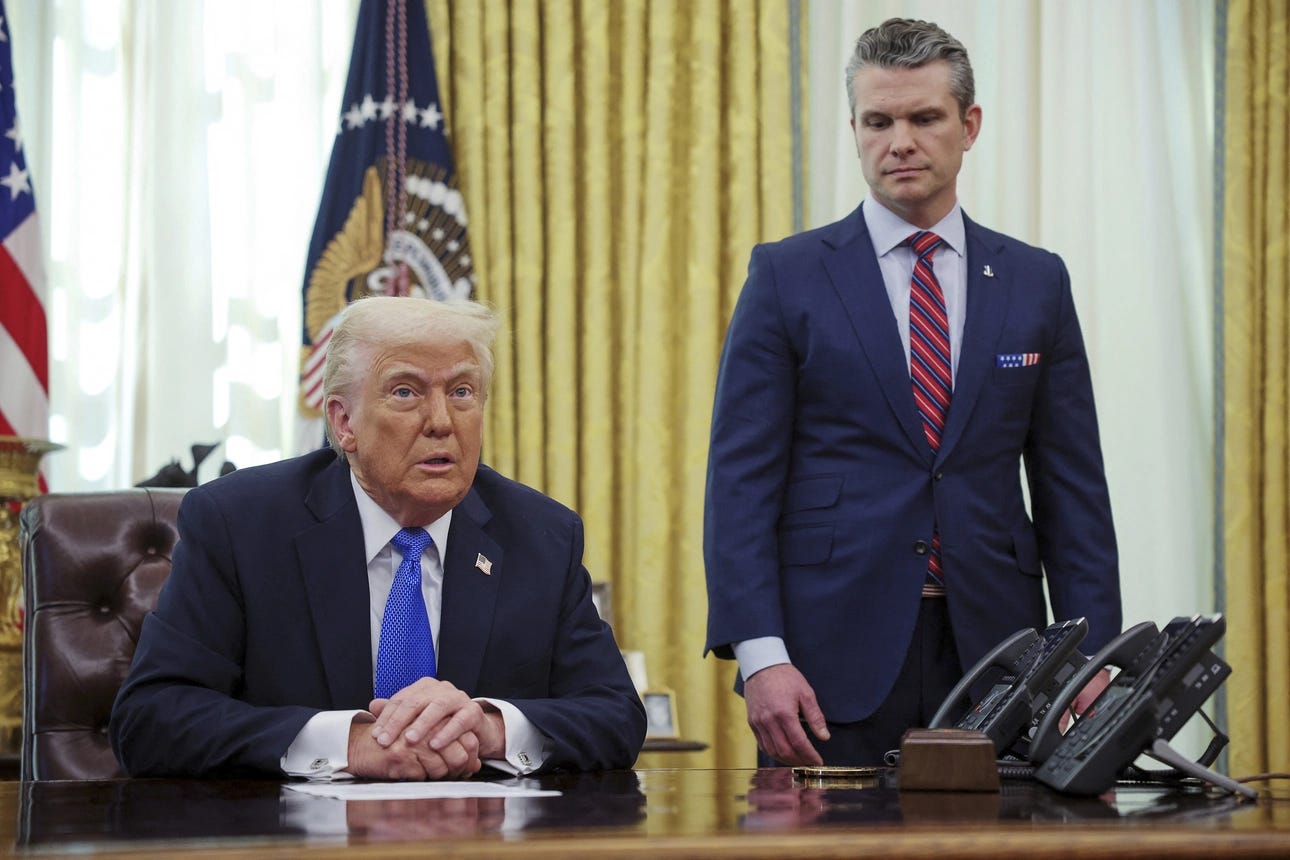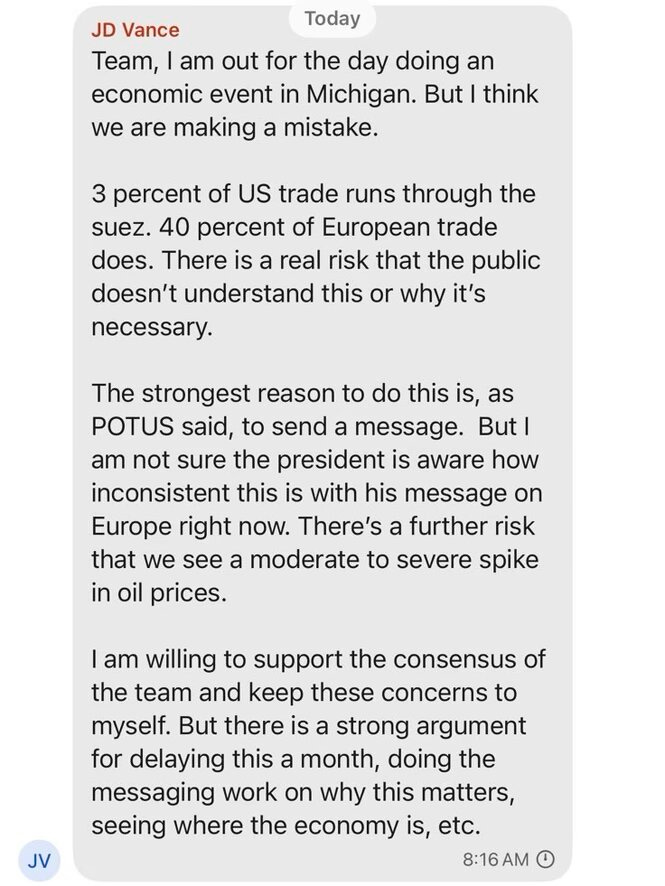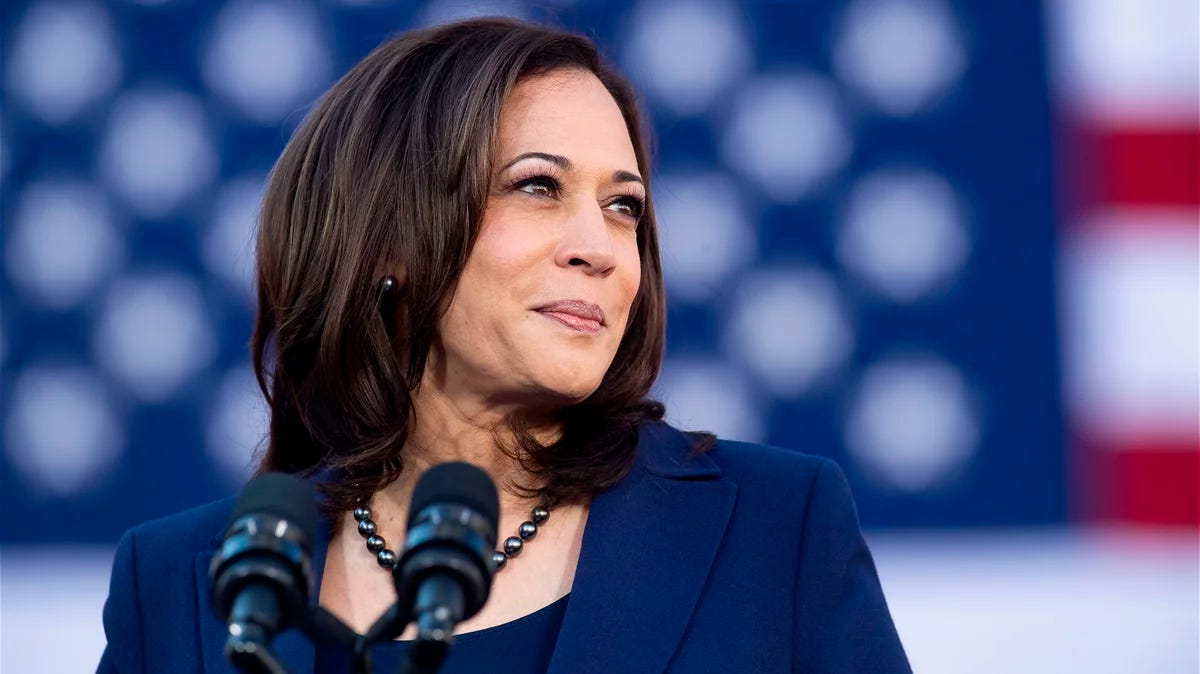Leaked Messages and Military Secrets: Trump’s Administration Faces a Major Scandal in Week Ten
From security clearances revoked to a classified military debacle on Signal, Trump’s second term faces mounting controversy.

The tenth week of President Trump’s second term was marked by an unprecedented national security scandal. Senior administration officials, including Vice President JD Vance, Defense Secretary Pete Hegseth, and Secretary of State Marco Rubio, were involved in a Signal group chat discussing classified military operations in Yemen—despite the platform not being authorized for sharing sensitive information. The planned strikes on the Houthi group had been previously reported by The Introspective. The situation escalated when Jeffrey Goldberg, editor-in-chief of The Atlantic, was accidentally added to the conversation, creating a significant security breach that went unnoticed by officials. The White House confirmed the chat’s existence as concerns over the “Signalgate” scandal grew, with experts suggesting the breach could violate the Espionage Act, a 1917 law criminalizing the unauthorized disclosure of national defense information.
Meanwhile, the Trump administration continued its push to downsize the federal government. On Monday, U.S. Postmaster General Louis DeJoy resigned amid speculation that Trump plans to privatize the Postal Service. Additionally, the administration canceled more than 68 health research grants focused on LGBTQ+ people, part of a broader rollback of Biden-era policies.
Immigration policy also stirred renewed controversy. The administration’s decision to revoke temporary protections for more than 500,000 immigrants from Cuba, Haiti, Nicaragua, and Venezuela has fueled anti-immigrant sentiment, with those affected ordered to leave the U.S. by late April. On Tuesday, Trump signed an executive order requiring proof of citizenship to vote in federal elections, raising concerns about its impact on voting rights.
Further controversy arose when Trump revoked security clearances for former Vice President Kamala Harris, former Secretary of State Hillary Clinton, and several Biden administration officials. The move blocks them from accessing classified intelligence, including the President’s Daily Brief.
In foreign policy, a breakthrough emerged in the Ukraine-Russia conflict. Following negotiations involving the U.S., Ukraine, and Russia, the parties agreed to a partial ceasefire in the Black Sea and a halt to attacks on energy infrastructure, signaling a potential shift in the war.
The Signal Scandal: Trump’s Military Plans
The popular messaging app Signal—known for its encryption policies—was at the center of a national security breach this week after a group chat containing members of the Trump administration discussing classified material was exposed. The chat included discussions about military operations against the Houthis in Yemen and revealed the name of an active Central Intelligence Agency (CIA) officer.
Those involved in the group chat included Vice President J.D. Vance, Defense Secretary Pete Hegseth, Secretary of State Marco Rubio, Director of National Intelligence Tulsi Gabbard, and National Security Adviser Mike Waltz.
Jeffrey Goldberg, editor-in-chief of The Atlantic, was accidentally added to the group chat by Waltz. The chat, named “Houthi PC small group,” involved the officials allegedly sharing classified information regarding U.S. military operations in the Middle East, particularly an airstrike against the Houthis in Yemen.
Within the group chat, Vice President Vance reportedly expressed concerns about the “inconsistent” messaging surrounding the timing of the strikes.
“I am not sure the president is aware of how inconsistent this is with his message on Europe right now. There's a further risk that we see a moderate to severe spike in oil prices. I am willing to support the consensus of the team and keep these concerns to myself. But there is a strong argument for delaying this a month, doing the messaging work on why this matters, seeing where the economy is, etc.,” Vance wrote.
Vance later told Hegseth in the chat, “If you think we should do it, let’s go,” referring to the strikes in Yemen.
“I just hate bailing Europe out again,” Vance added.
After the strikes were conducted, members of the group chat exchanged congratulatory messages. A previous report from The Introspective revealed that the strikes killed more than 50 people—mainly women and children.
“Good job, Pete, and your team!!” wrote the user “MAR,” who is alleged to be Secretary of State Marco Rubio.
“Great work and effects!” added Tulsi Gabbard.
Once The Atlantic reported on the group chat’s existence, White House National Security Council spokesman Brian Hughes confirmed the leak.
“At this time, the message thread that was reported appears to be authentic, and we are reviewing how an inadvertent number was added to the chain. The thread is a demonstration of the deep and thoughtful policy coordination between senior officials. The ongoing success of the Houthi operation demonstrates that there were no threats to our service members or our national security,” Hughes said in a statement.
Hegseth later denied the existence of the Signal group chat and dismissed Goldberg as “deceitful and highly discredited.”
“I've heard how it was characterized. Nobody was texting war plans, and that's all I have to say about that,” Hegseth said.
Fallout and Political Reactions
Senate Minority Leader Chuck Schumer called the Signal scandal “one of the most stunning breaches of military intelligence” in a speech on Monday.
“This is one of the most stunning breaches of military intelligence I have read about in a very, very long time,” Schumer said.
In an interview with CNN, former Defense Secretary and CIA Director Leon Panetta reacted to the leak, saying someone needed to be “fired.”
“How was the name of a journalist added to that list? This is just a serious blunder,” Panetta said, emphasizing that if someone other than Goldberg had been added to the chat, they “could reveal this information immediately to the Houthis in Yemen that they were about to be attacked and, in turn, could have… attacked U.S. facilities in the Red Sea, causing casualties among our troops.”
On Wednesday, following new reporting from The Atlantic, President Trump dismissed the security breach, emphasizing that the strike in Yemen was “very successful.”
“There weren’t details, and there was nothing in there that compromised [security]. And it had no impact on the attack, which was very successful,” Trump said in a report by The Hill, insinuating that Goldberg “found a way” to enter the group chat and downplaying the controversy.
“Maybe there’s a staffer, maybe there’s a very innocent staffer, but we’ll get—I think we’ll get to the bottom of it very quickly, and it’s really not a big deal,” Trump added.
National Security Implications
The “Signalgate” scandal has raised concerns that the Trump administration may have violated the Espionage Act, a 1917 law criminalizing unauthorized disclosure and storage of national defense information. There are also concerns that using Signal—an encrypted platform—may further violate federal records laws requiring the preservation of communications related to government activities. The messages in the group chat were set to expire after one week.
“In this context, information related to national defense also has to be information the possessor has reason to believe could be used to the injury of the United States or to the advantage of any foreign nation,” Politics Historian Sam Lebovic said in a report by ABC News.
“And if, as has been alleged, operational details were in that information, I think you could make the case that it would be information which could be used to the injury of the U.S. or to the advantage of a foreign nation. And technically, whether or not it's classified doesn't have bearing on that definition.”
Former CIA analyst Ned Price told NPR that “heads were exploding” as many former officials reacted to the massive security breach. He noted that the chat’s name, “Houthi PC small group,” likely refers to the Principals Committee—a high-level government body consisting of the heads of various departments and agencies.
“As Jeffrey Goldberg just alluded to, the Principals Committee—it's really the apex of the national security decision-making process. It's where the toughest, most consequential decisions are made. And to see it done in this manner, it is nothing that I think any of us ever could have expected,” Price said.
Privatization and Policy Rollbacks
U.S. Postmaster General Louis DeJoy resigned Monday after five years as head of the U.S. Postal Service. His resignation comes as President Trump and Elon Musk, head of the Department of Government Efficiency, have considered privatizing the agency.
“I believe strongly that the organization is well positioned and capable of carrying forward and fully implementing the many strategies and initiatives that comprise our transformation and modernization, and I have been working closely with the deputy postmaster general to prepare for this transition,” DeJoy said in a press release.
A previous report from The Introspective highlighted Trump’s plan to absorb the independent mail agency into the Department of Commerce, a move that many officials have opposed.
“Privatizing the Postal Service is an attack on Americans’ access to critical information, benefits, and life-saving medical care,” said Rep. Gerry Connolly, D-Va., in an interview with The Washington Post.
“It is clear that Trump and his cronies value lining their own pockets more than the lives and connection of the American public.”
The USPS employs more than 640,000 people who make deliveries across the U.S.
Meanwhile, the Trump administration canceled more than 68 grants that would have funded LGBTQ+ research, cutting up to $40 million in funding.
In a report by the Associated Press, Simon Rosser, a researcher studying cancer in gay and bisexual men at the University of Minnesota, warned of the harmful effects of canceling the grants.
“We now no longer have anywhere studying LGBT cancer in the United States,” Rosser said.
“When you decide to cancel all the grants on sexual minorities, you really slow down scientific discovery for everyone. Young researchers will lose their jobs, and the field as a whole will suffer.”
Other grants that were canceled included research on youth suicide, HIV prevention, and bone health.
Immigration Crackdown Continues
As Trump’s backlash to immigration grows, a previous Introspective report highlighted the administration’s plan to revoke legal protections for more than 500,000 immigrants from Cuba, Haiti, Nicaragua, and Venezuela. A memo from the Department of Homeland Security (DHS) stated that the administration will revoke “categorical parole programs for inadmissible aliens.”
The program, known as Cuban Haitian Nicaragua Venezuela (CHNV), helped more than 213,000 Haitians enter the United States, along with over 120,700 Venezuelans, 110,900 Cubans, and more than 93,000 Nicaraguans before the Trump administration shut it down.
At the same time, President Trump signed an executive order that requires proof of citizenship for federal elections, aiming to change the election process nationwide.
“Despite pioneering self-government, the United States now fails to enforce basic and necessary election protections employed by modern, developed nations, as well as those still developing,” the executive order read. It also requires states to reject ballots not received by Election Day, ordering the Department of Justice to “take all necessary action to enforce the requirement.”
The order also mandates updates to federal websites, such as the Election Assistance Commission (EAC), that people can use to register to vote. It requires prospective voters to show proof of citizenship to a state or local official. However, many election officials expressed concern over the executive order, claiming that elections are already highly protected and questioning Trump’s ability to direct the EAC.
“Even putting aside the substance, there’s a huge question about whether Trump can direct the EAC to do anything,” said Rick Hasen, a law professor at the University of California, Los Angeles (UCLA), to Politico.
“I think the answer is no. But this may well be tested in court.”
Hasen also pointed out that while Trump most likely doesn’t have the power to change election laws, it would “affect millions of registered voters’ ability to register and vote in federal elections” if he did.
Meanwhile, following a previous report detailing the Trump administration’s defiance of U.S. District Judge James Boasberg’s orders that blocked deportations of alleged undocumented immigrants under the Alien and Sedition Acts—a 1798 law that allows the president to arrest and deport noncitizens during times of war—the federal appeals court has maintained the temporary block on deportations. Boasberg is also presiding over the federal lawsuit against Trump’s cabinet members for their involvement in the “Signalgate” scandal.
“Indeed, at oral argument before this Court, the government in no uncertain terms conveyed that – were the injunction lifted – it would immediately begin deporting plaintiffs without notice,” wrote Judge Karen Henderson, adding that defying the court’s decision “risks exiling plaintiffs to a land that is not their country of origin,” where they could face torture and abuse in various prisons.
“Plaintiffs allege that the government has renditioned innocent foreign nationals in its pursuit against TdA. For example, one plaintiff alleges that he suffered brutal torture with ‘electric shocks and suffocation’ for demonstrating against the Venezuelan regime.”
Ukraine and Russia Ceasefire Talks
As the war in Ukraine continues, the United States, Ukraine, and Russia have agreed to a limited ceasefire aimed at easing fighting in the Black Sea and halting strikes on energy infrastructure. While Russian officials praised the deal, Ukrainian lawmakers reacted with uncertainty.
“Personally, I don’t think this will significantly boost our export capacity. Frankly speaking, thanks to Ukrainian naval drones, we have considerably expanded our capabilities in the Black Sea,” said lawmaker Yaroslav Zheleznyak.
However, on Thursday, Ukrainian President Volodymyr Zelenskyy accused Russia of violating the ceasefire after an attack on energy infrastructure in the Ukrainian city of Kherson killed two people and injured five overnight.
“This is not a battlefield,” Zelenskyy told ABC News.
“Civilians lost energy. I believe that there should be a reaction from the United States.”
While the White House praised the ceasefire as a major step toward ending the conflict, concerns over Trump’s alleged alliance with Russia continue to persist.
Security Clearance Revocations
President Trump revoked the security clearances of former Vice President Kamala Harris, former Secretary of State Hillary Clinton, and former members of the Biden administration. This follows a previous report that highlighted Director of National Intelligence Tulsi Gabbard revoking former President Joe Biden’s access to the Daily Brief, a classified intelligence report.
A memo obtained by The Introspective claims that the revocation of clearances applies to "receipt of classified briefings, such as the President's Daily Brief, and access to classified information held by any member of the Intelligence Community by virtue of the named individuals' previous tenure in Congress."
Others losing access to classified information and security clearances include former Secretary of State Antony Blinken, former Reps. Adam Kinzinger and Liz Cheney, former Deputy Attorney General Lisa Monaco, and former U.S. Ambassador to the Czech Republic Norman Eisen.










